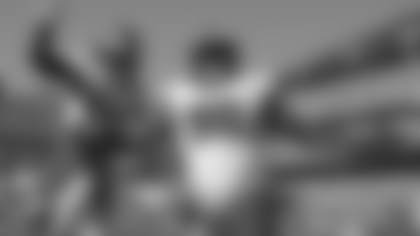Q. So you had Giants defensive coordinator, Steve Spagnuolo last week, and you have Panthers defensive coordinator, Sean McDermott this week. These are two guys that you worked with and that you're familiar with. A, are there similarities with what they run? And B, knowing him so well, going against him and being with him -- PAT SHURMUR: Right, yeah, that original staff with Coach Reid [former Eagles head coach and current Kansas City Chiefs head coach Andy Reid], there are guys all over the place and we interact quite a bit. [They are] very similar [in] how they deploy the defense. Some of the techniques of how they play up front, some of the coverage concepts are different. And again, you just have to follow the path of the guy we're talking about. Sean kind of reconnected with [Panthers Head Coach] Ron Rivera, who was involved with the [Tampa Bay Buccaneers Head Coach] Lovie Smith Tampa-two type of stuff and configuration, and so you see some of that, where Spags was kind of out of the nest, on his own, and then interacted with [Baltimore Ravens Head Coach] John [Harbaugh] down in Baltimore. So you kind of take on and you kind of add to yourself based on the experiences you've had, and I think that can be said for Sean.
Q. Dropped balls happen, bad passes happen, that's football. But the quarterback and receiver not agreeing on what the play is, these miscommunications shouldn't happen. How do you trace these things? Is it from the sideline where it's not being communicated properly?
PAT SHURMUR: No, I think they both knew the play, and again, I'm not going to really tell you why it got miscommunicated because that leads to scheme and we're going to run that play again. We actually ran that play numerous times in the game. But what it is is it's guys making the right decisions, and then throwing the ball accurately, and in that case there, they both fell victim to not doing the right thing properly, and I'll just leave it at that. But I don't think it was anything coming from the sideline, or not knowing what the play was. We were running Apple, and they all knew it was Apple, they just didn't execute it the right way.
Q. The one earlier with RB Darren Sproles on the first possession --
PAT SHURMUR: The ball on the flat, right.
Q. Where he is running a wheel route and he throws --
PAT SHURMUR: Yeah, I think that's just another example of Sprolesy was the first look in the flat, but then he had another part to the route that he was going to run, and he just got into it a little too quick.
Q. How is WR Nelson Agholor?
PAT SHURMUR: I don't know. You know, what happens is we get an initial report in the morning, and then these guys are training and doing their rehab, so I don't know if he'll be out here or not. We'll see.
Q. The last two games you've been running and throwing it for a lot of yards; how big is that when you're able to do both?
PAT SHURMUR: Well, from a yardage standpoint, that's more what we're used to. I think we've just got to tidy up the turnovers. I think when we're able to run the football, then play action is meaningful, not loss on those .But when we were running the ball, we hit a couple deep play actions, which are really helpful.
Q. Has Panthers LB Luke Kuechly become the kind of elite linebacker where you have to be aware of where he is on every snap?
PAT SHURMUR: Absolutely. I mean, Kuechly and [LB Thomas] Davis, as a pair, they're very instinctive; they diagnose very well, and they run extremely fast. They show up in concepts that, because they saw it, they get a jump on it. So, certainly, that's where the defense is extremely talented at that linebacker level. They've got really good players up front and in the back end, but the highlight of their defense would be the linebackers, especially Luke.
Q. It seems that QB Sam Bradford misses short more than he misses long. Is that something you see and why is that?
PAT SHURMUR: No, I don't think that's true, so there's no why to that.
Q. What kind of job are the receivers doing blocking, and does WR Riley Cooper kind of set the tone for that?
PAT SHURMUR: I think our guys, especially, and it got highlighted in the last game, have done a good job with perimeter blocks, and that really helps, whether we're just throwing a simple bubble with two blockers out front or if a ball splits out. Sometimes, we talk about turning a bad into good and good into great and great into touchdowns, and a lot of times it's the perimeter blocks that do that. So you may have a good run that's going to go for six or eight. If the ball spits out to the perimeter, then that can go for eight to 20, and then sometimes that goes from 20 to a touchdown, and I think a lot of that has to do with the receivers. A lot of times, blocking on the perimeter is all about effort and angles. You know, you've just got to fight to the whistle and take the right angle on your guys, and I think our guys have done a good job.
Q. Is there anyone who has really stepped up this year that has made an impression?
PAT SHURMUR: I think they've all done a good job. What comes to mind in the last game was [WR] Miles Austin; I thought he did a good job. Coop [Riley Cooper] has been a good blocker; [WR Josh] Huff is an extremely tough, competitive guy, and then certainly Jordan [Matthews]. So I think they've all done a good job.
Q. How tricky is it for running backs coach Duce Staley to get that combination and get all the backs enough reps and get them into a rhythm? It seems like they're all starting to click a little that way.
PAT SHURMUR: It's a little easier than you think when we get a lot of plays. When we get close to 80 plays, or 90 plays, then you get a good rotation. We have an idea of how we want it to flow, and then we just get it executed from the sideline. It's a little easier than you might think when you're getting a lot of plays. When you're not getting a lot of plays, that's when it affects the whole offense, and especially the substitution patterns.
Q. It seems like WR Riley Cooper is getting open deep a lot more than he did last year, comparable to two years ago. What has been going on there? What are you seeing?
PAT SHURMUR: Well, again, I think sometimes when you're able to get open deep, it's because you've found a way to run the football, and when you're running the football, then play action is meaningful. I think a lot of times, a lot of the deep throws that we've gotten have come off play actions, and I think that's just part of what football is. And then his baseball background, you know, he tracks the ball well in the deep part of the field. So typically, if the ball is thrown down around Riley, he'll do a good job downfield.
Q. But it seemed like last year that wasn't happening as much.
PAT SHURMUR: I don't know that; I wouldn't say that. We took his -- the scheme is the same. Maybe the ball just didn't get there as much, that's all.
Q. Not many guys have had the misfortune that Bradford has with two back-to-back ACLs. Do you think he's mentally over the two injuries now?
PAT SHURMUR: I think so. I think he's mentally over it. I think he's physically able to play. The big thing with Sam, and I mentioned this to the production guys last week, you know, he has just got to keep training and keep playing. You know, certainly when he plays the game, there are way more good plays than bad, and then as you play each game, you've got to eliminate the bad ones. And then everybody outside the building will start talking about that was a good performance, because he did a lot of things to help us win the game. But I do think there are some things that become glaring because they're significant plays that we've just got to eliminate, and I think he understands that.
Q. How much do you have to make sure that things don't get in his head as far as criticism, the interceptions, the up-and-down play?
PAT SHURMUR: Yeah, that's part of what we do as coaches; we try to encourage them to focus on the training, focus on Carolina. I don't think good or bad -- any of us can focus on what's said outside the building, and I think that's natural. We, as coaches, it's a little easier because we're in here all the time. As long as we can keep our wives from telling us what's being said when they're driving around town listening, just don't tell me. But these guys leave the building a little bit more, and we're in a new age now where they've always got their device in their hand, and I don't know. That whole --
Q. When you watched the tape, what did you see from Bradford?
PAT SHURMUR: Like I said, I saw a lot of good stuff; I saw a lot of things that we didn't see earlier. There were times when he was running around in the pocket that we didn't see earlier in the game, or earlier in the season. I think the obvious, we had a couple of interceptions which you've got to eliminate, for whatever reason, and I think he will. I think he'll do that, and I think he'll continue to get better. He hasn't played a lot of football in the last two years, and we're bringing him back. We're fortunate enough to be winning games, however we're doing it, and this thing is a 16-game journey until hopefully you're in the playoffs competing to win it all. So as we go through the journey, every one of us just keeps getting better; you keep training and you keep playing. It sounds cliche as coaches to say that, but that's really what it is. I know everybody has to evaluate what's going on and give praise and assign blame as we go, but we're just all training and getting better so that we give ourselves a chance to win it all.
Q. Is his movement in the pocket a product of his comfort coming back from the injury? Or is it from his comfort in the offense?
PAT SHURMUR: I think both. You know, I think he's certainly healthy enough to play, but as you go along -- you know, I had that injury, and as you come back from injury, you're out there and you're fine, but you become more and more fine as you go. You get used to your body a little bit more. Games are uncontrolled; guys show up and pop up out of the ground sometimes and you've got to avoid them. Or there's a guy standing there getting ready to tip the ball and you've got to adjust. So all those little movements that happen when you're in an uncontrolled setting you just get more and more used to it as you get further and further away from the injury and the surgery.
Q. Are you seeing moments where Bradford's wide receivers and tight ends can maybe help him out a little bit? I'm thinking particularly on the pass to WR Jordan Matthews where he was scrambling in the pocket and he kind of peeled off. It seemed like Jordan didn't --
PAT SHURMUR: Well, to me on that one, that was one where the pocket movement was great; he kept it alive and then he came, but I still think that falls on both of them. Jordan certainly could have come back to the ball a little bit more and then Sam could have thrown him a little bit higher of a ball. So there's an example where there's some good stuff going on on that play, we've just got to connect on it, you know, and I think that's it. And then certainly the way receivers help the quarterback is they don't drop balls. And where the quarterback helps the receivers is they throw them perfectly accurate, and then we all help each other and keep going on our journey.
Q. What happened on the interception in the second quarter? It looked like it was either an overthrow of TE Zach Ertz or an underthrow of WR Riley Cooper; what happened there?
PAT SHURMUR: Yeah, he just missed the throw. He missed the throw. I think the ball was intended for Zach, that's all. High throw. Train it up; get his feet right; make it the next time.
Q. You used two tight ends a fair amount like you did in the previous week; I know you were running the ball in the second half a lot.
PAT SHURMUR: Sure.
Q. The advantages of that are obvious, but the disadvantages are that sometimes you have to take a skill guy out wide off the field. How does that change your offense?
PAT SHURMUR: Well, we'd like to think when we are in one back, we can run every play we run, and whether we're in two tight ends or one tight end. The other night, we fell victim -- we had some receivers in and out of the game as you saw, and so the roster kind of changed on us throughout the game. So we used it probably a little more than we had planned, but it was working for us. Then we got into a game where we were running the ball and kind of played into that. But we really -- this time of the year, when you've got guys a little bit nicked, they're out there fighting and battling, we've got to use the whole roster, all the way down to [TE] Trey Burton at the tight end level, and we even trained [RB] Kenjon Barner to play running back and wide receiver. We're going to have to use the whole roster. We have a conceptual offense where you line up at one, two or three and you've got to know what to do, and that allows us to play fast. I think all our skill players have to be involved.
Q. There have been a lot of tough plays that have been with adjustments that are post-snap; with this offense, is it more relying on things like that compared to other systems you've been in?
PAT SHURMUR: Some plays, but not all. I think the one the other night was one where it's an adjusted route and a decision to be made. I won't tell you what number Riley was in the progression, but we have a progression. Typically, you want to throw it to the guys that are one-on-one or wide open, and then if they're not, you move on. I'm trying to simplify it -- you're looking for one-on-ones; if you catch it none- on-one, you like that better. [Laughter]
Q. I'm talking about the routes themselves sometimes.
PAT SHURMUR: Yeah, we have a few routes that are adjusted, and then we have other ones that are locked or fixed. So it's just part of it, and I think all offenses are the same. I don't think we have more or less here, even going back to the West Coast routes.
Q. When you had Bradford in St. Louis, albeit his rookie year, were you seeing the same mistakes you're seeing now? Or is it totally different?
PAT SHURMUR: Same mistakes. We weren't very good, and really not that many changes other than adding Sam Bradford, we went from winning one game to almost winning the division. I think sometimes we made mention of what people say outside -- you've got to just let it go and go play. That's why I say, 'Hey, you train and you play'. I think he'll continue to do better things and make less mistakes as we go, and I think I saw that process when we were together the first year.
Q. If you have a route that has adjustment built into it, depending on the coverage that the receiver is seeing, doesn't that adjustment have to be made X-yards into it, otherwise you're committed?
PAT SHURMUR: Yeah, it's time. Football and route running is all time, distance and spacing. So down the field as you're making an adjustment, it has to be on time.
Q. So that sort of general concept might be part of what happened?
PAT SHURMUR: Correct, correct. Yeah, that's good. Very insightful. [Laughter]















